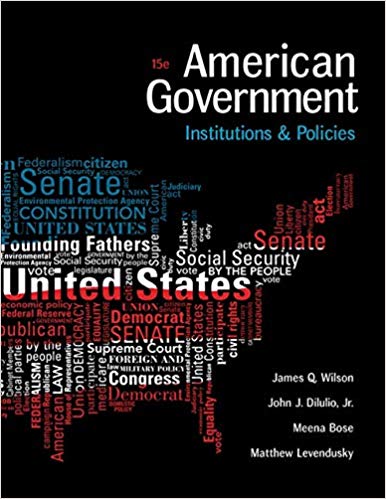Test Bank For American Government Institutions and Policies 15th Edition by James Q. Wilson
Digital item No Waiting Time Instant DownloadISBN-13: 978-1305500051 ISBN-10: 1305500059
In Stock
Original price was: $55.00.$28.00Current price is: $28.00.
Test Bank For American Government Institutions and Policies 15th Edition by James Q. Wilson
- For the Founders, federalism was a device to a. protect personal liberty.b. provide efficient local administration.c. encourage citizen participation.d. guarantee equality.e. protect against foreign invasion.ANSWER: aREFERENCES: Why Federalism Matters LEARNING OBJECTIVES: AGIP.WILS.17.3.1 – LO3.1
- In a confederation, the national government derives its power from a. the people.b. the states.c. the Congress.d. the courts.e. None of these choices is true.ANSWER: bREFERENCES: Why Federalism Matters LEARNING OBJECTIVES: AGIP.WILS.17.3.1 – LO3.1
- A federal republic derives its powers from a. the people.b. the states.c. the Congress.d. the courts.e. None of these choices is true.ANSWER: aREFERENCES: Why Federalism Matters LEARNING OBJECTIVES: AGIP.WILS.17.3.1 – LO3.1
7. Madison’s description of federalism in Federalist No. 46 suggests there should be little concern over conflicts between the federal and state governments becausea. the federal government would clearly be the winner in such conflicts.b. the state government would clearly be the winner in such conflicts.c. such conflicts would occur only on minor issues of importance. d. they are different agents with different powers.e. the judicial branch would settle such disputes.ANSWER: dREFERENCES: Why Federalism Matters LEARNING OBJECTIVES: AGIP.WILS.17.3.1 – LO3.1
- The Founders did not include in the U.S. Constitution an explicit statement of state powers but added it later in a. the Second Amendment.b. the Seventh Amendment.c. the Tenth Amendment.d. the Fourteenth Amendment. e. None of these choices is true.ANSWER: cREFERENCES: Why Federalism Matters LEARNING OBJECTIVES: AGIP.WILS.17.3.1 – LO3.1
- Just what sort of commerce Congress could regulate between the states was not spelled out in the U.S. Constitution becausea. delegates held competing views of commerce. b. of an oversight.c. commerce was a new phenomenon.d. slavery was involved.e. New York delegates refused to allow discussion on the matter.ANSWER: aREFERENCES: Why Federalism Matters LEARNING OBJECTIVES: AGIP.WILS.17.3.1 – LO3.1
Test Bank for American Government: Institutions and Policies, 15th Edition by James Q. Wilson
Overview: The 15th Edition of American Government: Institutions and Policies by James Q. Wilson provides a thorough examination of the U.S. government’s structure, processes, and policy-making. The test bank for this edition offers an extensive range of questions designed to assess students’ understanding of key concepts, promote critical thinking, and support effective exam preparation.
Content Details:
- Foundations of American Government:
- Overview: Explores the origins and philosophical foundations of the U.S. government.
- Topics Covered: The Constitution, the principles of democracy, federalism, and the historical context of American political development.
- The Constitution and Federalism:
- Overview: Examines the creation and significance of the U.S. Constitution and the concept of federalism.
- Topics Covered: Constitutional design, the Federalist and Anti-Federalist debates, the structure of federal and state powers, and the evolution of federalism.
- The Political Process:
- Overview: Analyzes the American political system, including elections, political parties, and interest groups.
- Topics Covered: The electoral process, campaign dynamics, party systems, and the influence of interest groups and political action committees (PACs).
- The Presidency:
- Overview: Focuses on the roles, powers, and functions of the U.S. presidency.
- Topics Covered: Presidential powers, the executive branch structure, executive orders, presidential leadership, and the impact of the presidency on domestic and foreign policy.
- Congress:
- Overview: Investigates the functions and powers of the U.S. Congress.
- Topics Covered: Congressional organization, the legislative process, the role of committees, and the influence of Congress on policy and governance.
- The Judiciary:
- Overview: Examines the role and structure of the judicial branch.
- Topics Covered: The federal court system, the Supreme Court’s role and decisions, judicial review, and landmark cases that have influenced American law.
- Public Policy:
- Overview: Analyzes how public policies are formulated and implemented.
- Topics Covered: The policy-making process, economic policy, social policy, environmental policy, and the role of government in shaping policy.
- Civil Rights and Liberties:
- Overview: Explores the development and protection of civil rights and liberties in the U.S.
- Topics Covered: Key amendments, landmark legislation, Supreme Court decisions, and contemporary issues related to civil rights and personal freedoms.
- State and Local Government:
- Overview: Investigates the roles and functions of state and local governments.
- Topics Covered: The organization and powers of state governments, local government structures, intergovernmental relations, and the role of state and local officials.
Test Bank Features:
- Multiple-Choice Questions: Assess fundamental understanding of key concepts and terms.
- True/False Questions: Test basic knowledge and conceptual clarity.
- Short Answer Questions: Require concise responses and explanations of specific governmental functions and processes.
- Essay Questions: Encourage in-depth analysis of complex topics, such as the roles of different branches of government and the impact of policies.
- Case Studies: Provide real-world scenarios for students to apply theoretical knowledge and analyze practical issues in American government.
Conclusion:
The test bank for American Government: Institutions and Policies, 15th Edition by James Q. Wilson is a valuable resource for students studying American government. It covers essential topics with a range of question types that test comprehension, application, and critical thinking. By offering diverse question formats and focusing on key aspects of American governance, the test bank aids in reinforcing students’ understanding of political structures and processes, ultimately preparing them for academic success and practical engagement with governmental issues.


Reviews
There are no reviews yet.